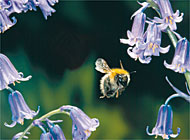
Organic farming comes of age

Swiss organic researchers say working with nature rather than against it, is the future for agriculture.
Speaking in Basel on Tuesday, they described some of the ways in which they are harnessing nature to improve crop yields and combat plant diseases.
One classic success story has been in strawberry production where the berry can be destroyed by grey mould fungal disease.
Another fungus can be used to attack the grey mould and this second fungus, or antagonist, can be successfully spread by bees.
Dr Eric Wyss who works at the Research Institute of Organic Agriculture in Frick, says this method has proved highly effective.
“At the entrance to the hive there is a little footbath and as the bees pass they carry these antagonists on their legs and feet and take it to the flower.
“With this flying doctor system, you put the antagonist on the flower where it can attack the other fungus which causes the disease on the strawberry.”
Switzerland has been a pioneering country in all aspects of organic farming for more than half a century and today about 90,000 hectares or 8.5 per cent of Switzerland’s total agricultural area is organic.
In the boom years of the 1990s, the number of organic farms increased from 800 to 5,000 while the market for organic food grew by 20 per cent every year and now represents about SFr600 million or two per cent of the Swiss total food market.
Various factors have driven the growth, particularly recent food scares, says Dr Wyss. “In the whole of Europe, consumer demand is growing very rapidly due to scandals, like BSE. It was the case in the UK and it is now the case in Germany. The consumer is demanding naturally produced products and I think this is the future direction for agriculture.”
The Swiss parliament is preparing to discuss a possible moratorium on the commercial release of genetically engineered plants. Biologist, Florianne Koechlin of the Blue Ridge Institute in Basel says Switzerland should be a leader in organic farming.
“Switzerland with its mountains and hills doesn’t have a large, flat area where we can have industrialised agriculture and monoculture. We never can compete with this kind of agriculture but what we can do is produce healthy and natural and guaranteed gene-tech-free food, and that’s something that everybody in Europe wants as all the opinion polls show.”
by Vincent Landon

In compliance with the JTI standards
More: SWI swissinfo.ch certified by the Journalism Trust Initiative





























You can find an overview of ongoing debates with our journalists here . Please join us!
If you want to start a conversation about a topic raised in this article or want to report factual errors, email us at english@swissinfo.ch.